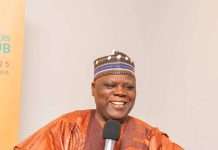
In this exclusive interview with MOSES DIKE, eminent community pharmacist and managing director of Ladith Pharmaceutical Limited, Pharm. (Dr) Lawrence Ifebigh, speaks about his childhood, education, career and other factors that have contributed to his success in life and business. Below is the full interview.
Kindly tell us about yourself, your early childhood experiences, education and the events that have helped to shape your adult personality.
As you already know, my name is Pharm. (Dr) Lawrence Nnaemeka Ifebigh. I am a Fellow of the Pharmaceutical Society of Nigeria (PSN). I was born on 9 September 1947; so, by 9 September, this year, I will be 76. I belong to the Anglican Church and I was made a Knight of St. Christopher in year 2000.
I was born in Onitsha to a fairly wealthy family. I started my primary education in 1952 and did very well. I came out with distinction. I started secondary school in 1961 and graduated in 1965. I had A’s in all my subjects.
How did you come about Pharmacy as your course of study? Did you have any role models in your younger days who guided you to make the choice? If you were not a pharmacist, what else would you have loved to become?
Somehow, I believe it is my destiny to be a pharmacist because soon after I received my WAEC result, I got a scholarship to study Pharmacy at Patrice Lumumba Friendship University, in Moscow, Russia. But before we could leave the country in August 1967, the Nigerian civil war had started. The Biafran troops were reported to be at Ore, in the western region; so it was impossible to join Aeroflot, the Russian plane that came to collect the prospective students.
We all know that the civil war went off full blast in 1967 and that put a temporary stop to my quest for education. After the civil war, we had to organise ourselves to start again.
Actually, I made up my mind to study Pharmacy while in secondary school. I was always coming first in my class, from class 2 to class 5. Coming first in class means that you were very good at both science and arts subjects. Therefore my secondary school teachers took special interest in my education. They were all coming to my family house in Onitsha to tell my mother that I should study Medicine for my degree programme.
Because of my nature, I could never have studied Medicine. I was frightened by surgery. I could not cut a human being, with blood coming out; so the alternative was Pharmacy. I could have become a pharmacy student in Russia in 1967 but l later became a pharmacy student at University of Nigeria, Nsukka, in 1972. Five years were wasted because of the Nigerian civil war. I graduated in June 1977.
While in secondary school, my major hobbies were going to the cinema and listening to music. This shaped my life because today I still watch films in my house and I play music every morning when I wake up.
As I advance in age my priority has been to advance the cause of community pharmacy. I started my pharmacy practice in January 1982 and decided that my priority would be rare ethical pharmaceutical products used in tertiary hospitals. So, I concentrated my business in University of Benin Teaching Hospital (UBTH), SPDC (Shell, Warri), University of Nigeria Teaching Hospital, Enugu (UNTH), and National Hospital, Abuja. In fact, in Benin City, from those early days, my pharmacy – Ladith Pharmaceutical Company Limited – was well known for ethical products.
I live in Benin City. What actually brought me to Benin City was my NYSC. I found Benin City a conducive environment to practise pharmacy the way I wanted to do it. I came to Benin City for my NYSC in 1978 and finished in 1979. I became a medical representative for Wellcome Nigeria Limited in 1979. I worked in Wellcome till December 1981. I started my company, Ladith Pharmaceutical Company Limited, in January 1982. I became a Fellow of the Pharmaceutical Society of Nigeria in 2016.
Why did you settle for community pharmacy practice and how satisfying do you find your career?
You asked me why I chose community practice instead of any other aspect of pharmacy practice. It was a simple choice to make, as I did my internship in a teaching hospital. I realised that some women who worked in the pharmacy played a lot of truancy. For example, very often they got excuse duty from the doctors to travel on a Monday to resume the next Monday. At the end of the month when salary vouchers were presented, you would find that everybody earned a full salary.
I told myself that I would not work in a government establishment where people earned their full monthly wages, whether they worked for the full month or not. I would rather work for myself where my income is directly proportional to the amount of work I put in.
As a senior pharmacist, which of the issues affecting Pharmacy and healthcare in general would you like the government and stakeholders to address more frontally, especially as we usher in a new government in Nigeria?
From the line of practice that I followed, I was importing rare ethical drugs from London almost every three months, but today it is not so. The foreign exchange you need to make the importation is no longer available. If you have to bring in the rare ethical drugs into the country, you must source for foreign exchange from the black market. This has skyrocketed the price of pharmaceutical products almost beyond the reach of the ordinary Nigerian.
I think it is wrong for Nigeria to have two or more exchange rates for her currency. This has been a terrible experience for those of us in private practice. The government has to tackle this urgently.
From my experience, rare ethical products are a major issue in the success of pharmacy practice in Nigeria. The Pharmacy Council of Nigeria and the Pharmaceutical Society of Nigeria should, at the highest level, work with the incoming government and insist that the right things should be done.
How do you relax? Tell us about some of the pastime activities and lifestyle modifications you have adopted to stay fit and active.
While as a medical representative, I joined the Benin Club in 1979. From those early days, I played table tennis and squash. But, today, I no longer play squash because of my age. About 10 years ago, I joined the golf section of the Benin Club. I also joined the billiards and snookers sections in same Benin Club.
But I must emphasise that my major pastime is listening to music. It helps me to relax. It makes me happy. I don’t even feel my age. In fact, I feel younger every day, to the glory of the Almighty God.
Tell us about your family. Did any of your children take after you to study Pharmacy or other health-related professions?
About my family, I have seven children. One of them, a lady, married and living in Lagos, is a pharmacist. She is also into community pharmacy practice. My last child, a boy, is currently studying Pharmacy at Madonna University. By God’s grace, he will graduate this year.
My wife, Dr (Mrs) Edith Ifebigh, studied Chemistry as first and second degree. Some 20 years ago, when my practice became a little vast, I encouraged my wife to study Pharmacy. She obtained Pharm.D and joined me in the practice.
Given your wealth of experience, what advice would you like to give to the younger generation of pharmacists on how to make the best use of their calling as healthcare professionals to impact humanity positively?
I have been a patron of PANS-UNIBEN since 1985 and with my wealth of experience, I will advise the young and upcoming pharmacists to give their best shot to whatever aspect of pharmacy practice they choose. Pharmacy profession is a major aspect of the healthcare sector. They should not be in a hurry but keep pushing without ceasing in the positive direction because we have a great profession called Pharmacy.











